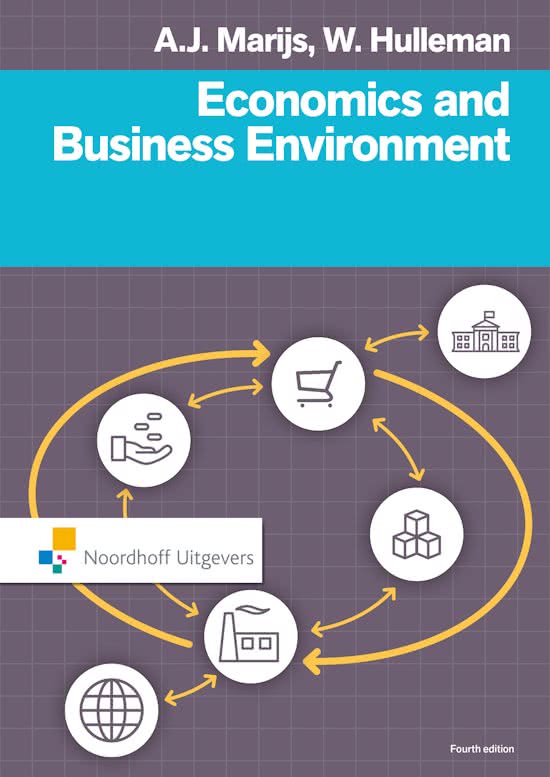Economics
Table of Contents
ECONOMICS ................................................................................................................................. 1
CHAPTER 9 INTERNATIONAL ECONOMIC RELATIONS ........................................................................................ 2
9.1 International economic trends .................................................................................................. 2
9.2 The theory of comparative costs ............................................................................................... 3
9.3 Free trade and protectionism .................................................................................................... 3
9.4 The balance of payments........................................................................................................... 5
9.5 International cooperation ......................................................................................................... 5
Glossary ........................................................................................................................................... 6
CHAPTER 10 THE FOREIGN EXCHANGE MARKET ............................................................................................. 7
10.1 Characteristics of the foreign exchange market ..................................................................... 7
10.2 Spot exchange rate .................................................................................................................. 7
10.3 Exchange rate systems ............................................................................................................ 9
10.5 Forward exchange rate ........................................................................................................... 9
10.6 Exchange rate risk ................................................................................................................. 10
, Chapter 9 International economic relations
9.1 International economic trends
Two main economic trends are becoming obvious: the expansions of emerging markets and
globalisation.
9.1.1 An overview of the world economy
The IMF classifies the world economy into three categories: advanced economies, emerging markets
and developing countries.
The development of the global distribution of production is dependent on economic growth.
Advanced economies lagged behind the world’s average, therefore their share of the world’s
production was decreasing. In contrast to the developing countries, they had a growth rate higher
than the average, their share was increasing.
9.1.2 Globalisation
Globalisation: the process of world-wide integration of economies caused by the rapid increase in
trade and cross-border investments.
Two main reasons for globalisation:
1. Technological innovations: transport and communication have made the wold ‘smaller’. Transport
has become cheaper, which made the geographical distance between places less important. ICT is
makes the exchange of information between places faster and cheaper (interconnectedness).
Increasing global sourcing, a strategy in which a company establishes non-location specific
business operations in those parts of the world where the costs and the added value are most
favourable.
2. Deregulation (and liberalisation): deregulation is the process by which governments
remove, reduce, or simplify restrictions on businesses and individuals with the intent of
encouraging the efficient operation of markets.
Liberalisation usually refers to less government regulations and restrictions in the whole
economy, in exchange for greater participation of private entities.
Capital transactions between advanced countries is free and trade between these
economies face a decreasing number of restrictions. Deregulation of the international
economic transactions gives companies more freedom to decide where in the world they
will buy, sell and produce.
Facts about globalisation:
1. Developments in the world trade: the world trade is the sum of export (or import) of
goods and services. The increase in world trade has been grater than the increase in world
production. The world export ratio (world trade / world production) therefore has
accelerated and the higher the world export ratio, the more open the national economies
are. Companies are increasingly exporting worldwide; this should lead to a reduction of
the intraregional (in region of the country) trade between countries.
2. Developments in international investment: world-wide production is accompanied by
direct investments abroad. Direct investments are the acquisition of an interest in a
foreign company for the purpose of exercising an influence on its policies. For developing
countries, direct investments are an important driver for economic growth. These
countries often have a surplus of labour but a lack of capital, management expertise and
technical knowledge. Direct investments provide developing countries access to capital as well as
the associated technology (more international flow of capital and labour).
Table of Contents
ECONOMICS ................................................................................................................................. 1
CHAPTER 9 INTERNATIONAL ECONOMIC RELATIONS ........................................................................................ 2
9.1 International economic trends .................................................................................................. 2
9.2 The theory of comparative costs ............................................................................................... 3
9.3 Free trade and protectionism .................................................................................................... 3
9.4 The balance of payments........................................................................................................... 5
9.5 International cooperation ......................................................................................................... 5
Glossary ........................................................................................................................................... 6
CHAPTER 10 THE FOREIGN EXCHANGE MARKET ............................................................................................. 7
10.1 Characteristics of the foreign exchange market ..................................................................... 7
10.2 Spot exchange rate .................................................................................................................. 7
10.3 Exchange rate systems ............................................................................................................ 9
10.5 Forward exchange rate ........................................................................................................... 9
10.6 Exchange rate risk ................................................................................................................. 10
, Chapter 9 International economic relations
9.1 International economic trends
Two main economic trends are becoming obvious: the expansions of emerging markets and
globalisation.
9.1.1 An overview of the world economy
The IMF classifies the world economy into three categories: advanced economies, emerging markets
and developing countries.
The development of the global distribution of production is dependent on economic growth.
Advanced economies lagged behind the world’s average, therefore their share of the world’s
production was decreasing. In contrast to the developing countries, they had a growth rate higher
than the average, their share was increasing.
9.1.2 Globalisation
Globalisation: the process of world-wide integration of economies caused by the rapid increase in
trade and cross-border investments.
Two main reasons for globalisation:
1. Technological innovations: transport and communication have made the wold ‘smaller’. Transport
has become cheaper, which made the geographical distance between places less important. ICT is
makes the exchange of information between places faster and cheaper (interconnectedness).
Increasing global sourcing, a strategy in which a company establishes non-location specific
business operations in those parts of the world where the costs and the added value are most
favourable.
2. Deregulation (and liberalisation): deregulation is the process by which governments
remove, reduce, or simplify restrictions on businesses and individuals with the intent of
encouraging the efficient operation of markets.
Liberalisation usually refers to less government regulations and restrictions in the whole
economy, in exchange for greater participation of private entities.
Capital transactions between advanced countries is free and trade between these
economies face a decreasing number of restrictions. Deregulation of the international
economic transactions gives companies more freedom to decide where in the world they
will buy, sell and produce.
Facts about globalisation:
1. Developments in the world trade: the world trade is the sum of export (or import) of
goods and services. The increase in world trade has been grater than the increase in world
production. The world export ratio (world trade / world production) therefore has
accelerated and the higher the world export ratio, the more open the national economies
are. Companies are increasingly exporting worldwide; this should lead to a reduction of
the intraregional (in region of the country) trade between countries.
2. Developments in international investment: world-wide production is accompanied by
direct investments abroad. Direct investments are the acquisition of an interest in a
foreign company for the purpose of exercising an influence on its policies. For developing
countries, direct investments are an important driver for economic growth. These
countries often have a surplus of labour but a lack of capital, management expertise and
technical knowledge. Direct investments provide developing countries access to capital as well as
the associated technology (more international flow of capital and labour).



